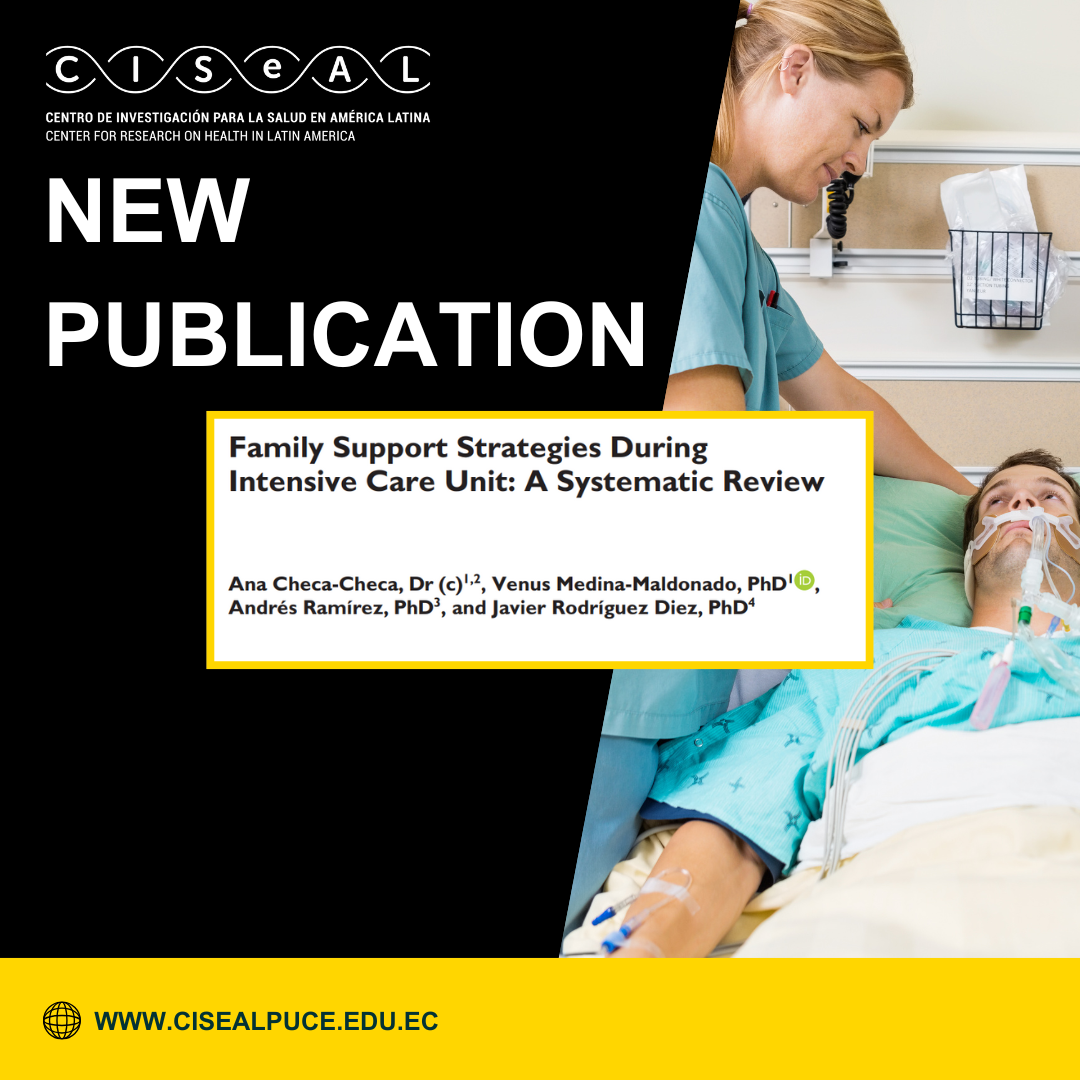 This study, with the participation of CISeAL researcher Venus Medina, systematically analyzes support strategies for families of critically ill patients admitted to intensive care units (ICUs), focusing on the effectiveness of nursing interventions compared to standard care. The review covered articles published between 2015 and 2025 in databases such as PubMed, Scopus, CINAHL, SciELO, and Web of Science, following the PRISMA 2020 guidelines, and applied quality assessment tools such as the Johns Hopkins model and the ROB 2 instrument. Eighteen studies with diverse samples, although predominantly female, were included. These studies evaluated interventions aimed at communication, decision-making, and strengthening the emotional bond between family members and ICU patients. Strategies ranged from in-person programs—such as structured communication during rounds, open visitation policies, and family participation in care—to technology-mediated approaches that facilitated guidance and decision-making.
This study, with the participation of CISeAL researcher Venus Medina, systematically analyzes support strategies for families of critically ill patients admitted to intensive care units (ICUs), focusing on the effectiveness of nursing interventions compared to standard care. The review covered articles published between 2015 and 2025 in databases such as PubMed, Scopus, CINAHL, SciELO, and Web of Science, following the PRISMA 2020 guidelines, and applied quality assessment tools such as the Johns Hopkins model and the ROB 2 instrument. Eighteen studies with diverse samples, although predominantly female, were included. These studies evaluated interventions aimed at communication, decision-making, and strengthening the emotional bond between family members and ICU patients. Strategies ranged from in-person programs—such as structured communication during rounds, open visitation policies, and family participation in care—to technology-mediated approaches that facilitated guidance and decision-making.
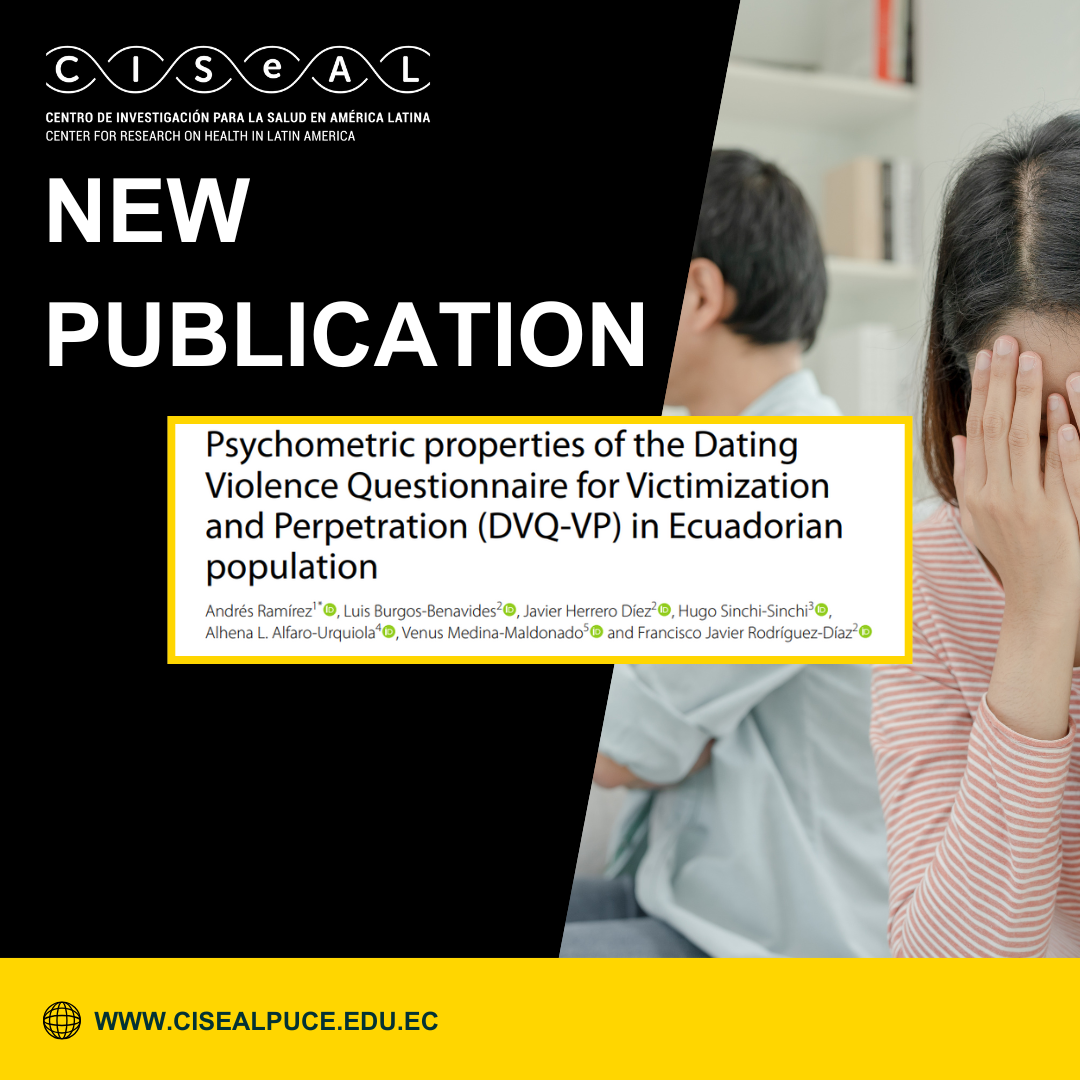 This study, with the participation of Dr. Venus Medina, principal investigator at CISeAL, addresses dating violence as an early manifestation of intimate partner violence, with significant consequences for health and social well-being. This phenomenon, characterized by its complexity, variability, and bidirectionality, requires methodologically rigorous instruments that allow for the precise identification of its dynamics among adolescents and young adults. The DVQ-VP, short for Dating Violence Questionnaire for Victimization and Perpetration, emerges as a culturally adapted and validated tool in Spanish-speaking populations, which assesses both victimization and perpetration across five dimensions: physical violence, psychological violence, sexual violence, controlling behaviors, and relational aggression.
This study, with the participation of Dr. Venus Medina, principal investigator at CISeAL, addresses dating violence as an early manifestation of intimate partner violence, with significant consequences for health and social well-being. This phenomenon, characterized by its complexity, variability, and bidirectionality, requires methodologically rigorous instruments that allow for the precise identification of its dynamics among adolescents and young adults. The DVQ-VP, short for Dating Violence Questionnaire for Victimization and Perpetration, emerges as a culturally adapted and validated tool in Spanish-speaking populations, which assesses both victimization and perpetration across five dimensions: physical violence, psychological violence, sexual violence, controlling behaviors, and relational aggression.
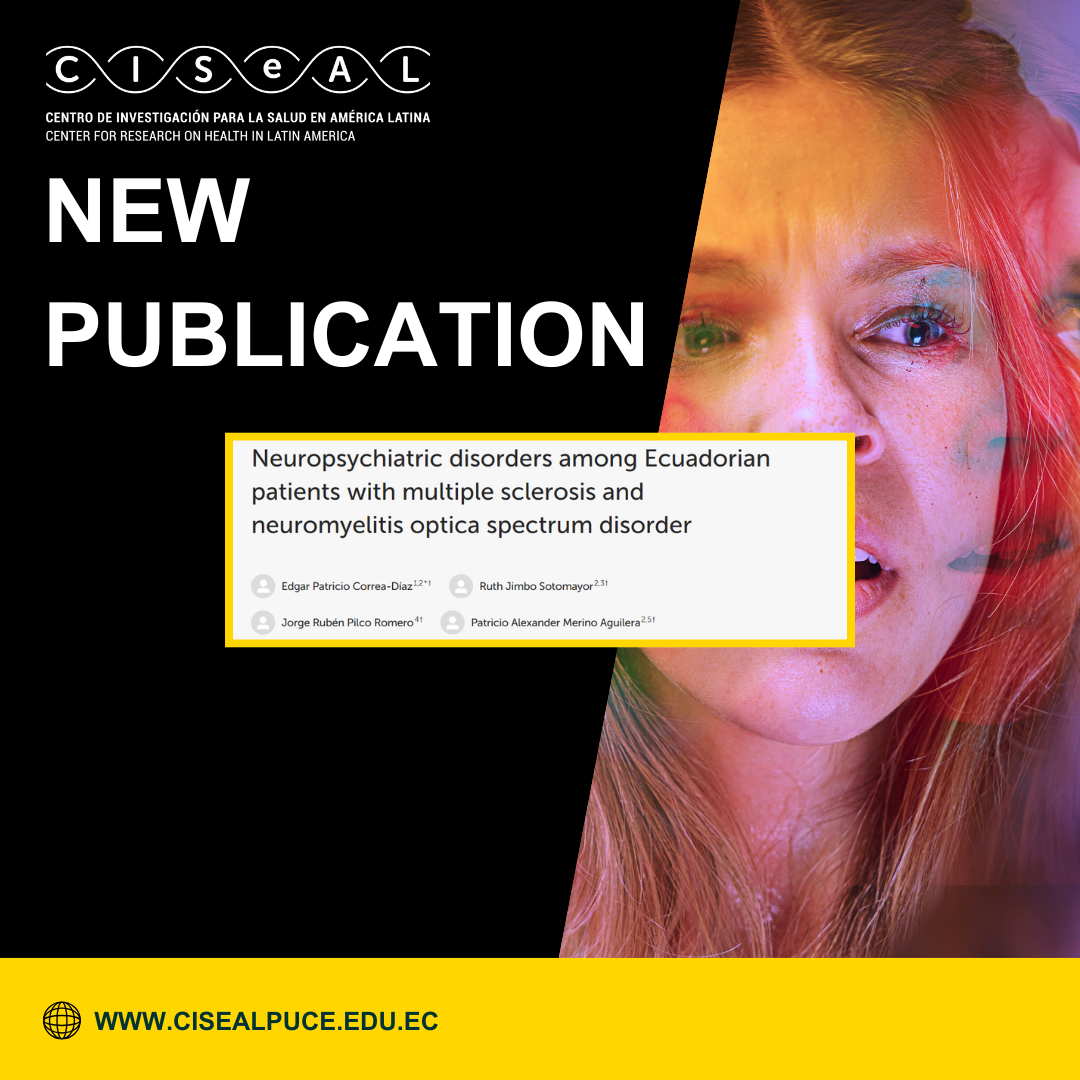 Our principal investigator at CISeAL, Dr. Ruth Jimbo, participated in a study that reveals the high prevalence of neuropsychiatric disorders in Ecuadorian patients with central nervous system demyelinating diseases—multiple sclerosis (MS) and neuromyelitis optica spectrum disorder (NMOSD)—treated at the Carlos Andrade Marín Hospital in Quito, a referral center that concentrates around 60% of MS cases and 70% of NMOSD cases in the country. The study included 151 adult participants (117 with MS; 34 with NMOSD) who met current international diagnostic criteria. Sociodemographic data and disability status (EDSS) were documented, and psychiatric instruments validated in Ecuador (Hamilton, BDI‑II, MINI, CGI‑BP‑M, ISO‑30) were applied by trained psychologists. Women and mestizo populations predominated in both cohorts; NMOSD patients were on average older (49.8 vs. 42.3 years) and had greater disability (mean EDSS 4.23 vs. 2.5), with more cases in the moderate/severe range. The overall prevalence of neuropsychiatric disorders was high: 70.9% in MS and 85.29% in NMOSD. Moderate/severe anxiety was significantly more frequent in NMOSD, while depression showed comparable rates between groups.
Our principal investigator at CISeAL, Dr. Ruth Jimbo, participated in a study that reveals the high prevalence of neuropsychiatric disorders in Ecuadorian patients with central nervous system demyelinating diseases—multiple sclerosis (MS) and neuromyelitis optica spectrum disorder (NMOSD)—treated at the Carlos Andrade Marín Hospital in Quito, a referral center that concentrates around 60% of MS cases and 70% of NMOSD cases in the country. The study included 151 adult participants (117 with MS; 34 with NMOSD) who met current international diagnostic criteria. Sociodemographic data and disability status (EDSS) were documented, and psychiatric instruments validated in Ecuador (Hamilton, BDI‑II, MINI, CGI‑BP‑M, ISO‑30) were applied by trained psychologists. Women and mestizo populations predominated in both cohorts; NMOSD patients were on average older (49.8 vs. 42.3 years) and had greater disability (mean EDSS 4.23 vs. 2.5), with more cases in the moderate/severe range. The overall prevalence of neuropsychiatric disorders was high: 70.9% in MS and 85.29% in NMOSD. Moderate/severe anxiety was significantly more frequent in NMOSD, while depression showed comparable rates between groups.
The highest concentration of anxiety and depression was observed in the 41–50 age group in both diseases, but without statistically significant differences by age. Similarly, when stratified by disability, neuropsychiatric conditions clustered in mild disability in MS and moderate disability in NMOSD, without statistical significance. Problematic alcohol or substance use, as well as other diagnoses (bipolar disorder, social phobia, insomnia), was low; a low frequency of suicide attempts was also reported. These findings highlight the need for systematic screening and early multidisciplinary approaches to mental health in people with MS and NMOSD in the Latin American context.
We invite you to review the complete article for full details and results tables at the following link:We invite you to review the complete article for full details and results tables at the following link:
https://www.frontiersin.org/journals/neurology/articles/10.3389/fneur.2025.1587804/full
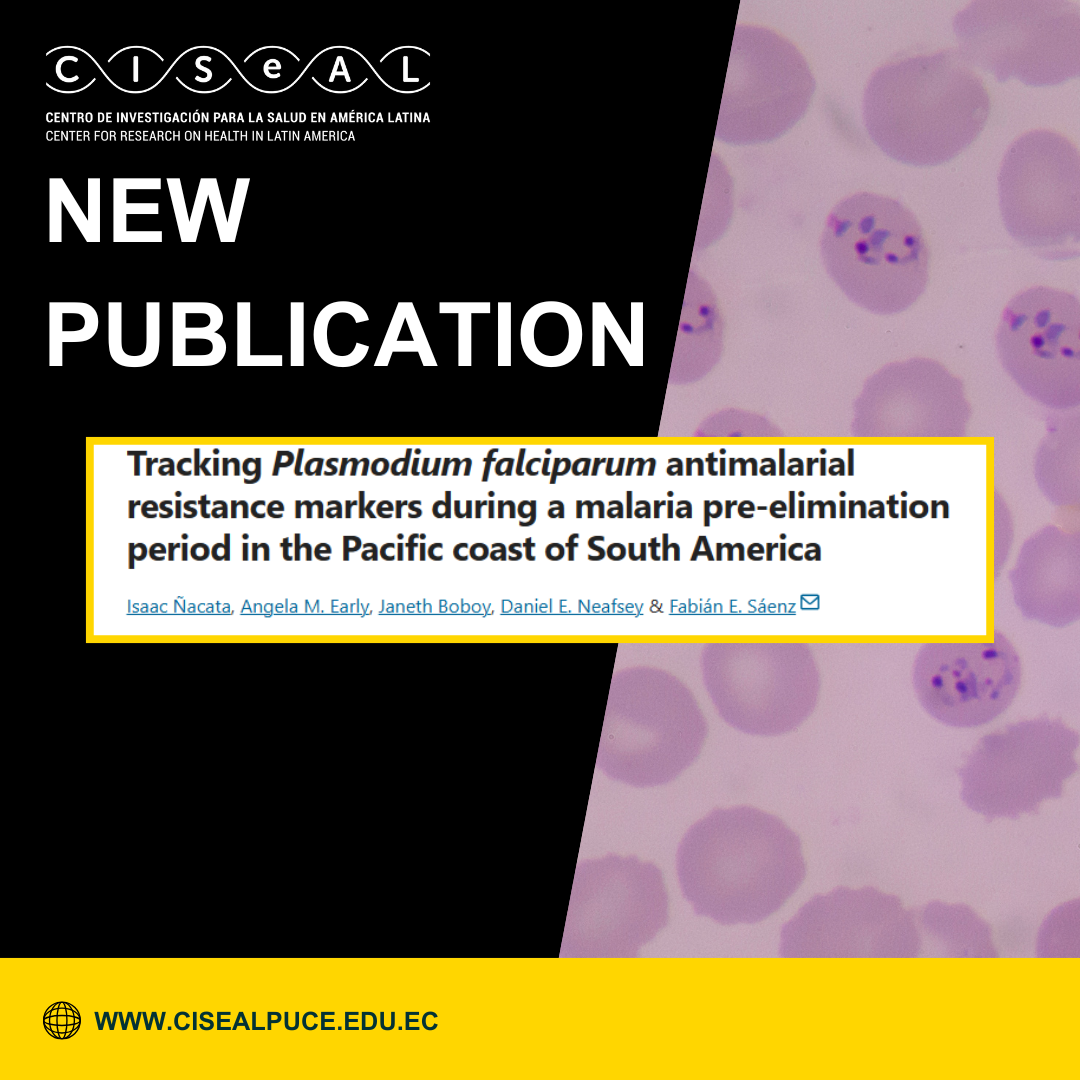 The study analyzes the dynamics of antimalarial resistance in Plasmodium falciparum on the Pacific coast of Ecuador during 2019–2021, a critical period toward malaria pre-elimination, with emphasis on the influence of pharmacological pressure and human migration. The study was led by Dr. Fabián Sáenz, principal investigator of CISeAL, and was developed from the Bachelor's dissertation work of Isaac Ñacata in Biological Sciences. The work evaluated resistance genes (Pfcrt, Pfdhps, Pfdhfr, Pfmdr-1, Pfk13, and Pfaat1) in samples from the Esmeraldas and Carchi provinces and compared the frequencies of resistance mutations with data from 2013–2015. The results show a significant increase in haplotypes resistant to chloroquine (Pfcrt) and pyrimethamine (Pfdhfr), evidencing strong selective pressure. In contrast, sensitivity to sulfadoxine (Pfdhps) and artemisinin (Pfk13) was maintained, with the wild-type haplotype present in 100% of samples. In addition, the A16V mutation in Pfdhfr, linked to resistance to proguanil, was identified for the first time in Ecuador. The NEDFSDFY haplotype was also detected in Pfmdr-1, associated with multidrug resistance, reflecting the complexity of the resistance landscape.
The study analyzes the dynamics of antimalarial resistance in Plasmodium falciparum on the Pacific coast of Ecuador during 2019–2021, a critical period toward malaria pre-elimination, with emphasis on the influence of pharmacological pressure and human migration. The study was led by Dr. Fabián Sáenz, principal investigator of CISeAL, and was developed from the Bachelor's dissertation work of Isaac Ñacata in Biological Sciences. The work evaluated resistance genes (Pfcrt, Pfdhps, Pfdhfr, Pfmdr-1, Pfk13, and Pfaat1) in samples from the Esmeraldas and Carchi provinces and compared the frequencies of resistance mutations with data from 2013–2015. The results show a significant increase in haplotypes resistant to chloroquine (Pfcrt) and pyrimethamine (Pfdhfr), evidencing strong selective pressure. In contrast, sensitivity to sulfadoxine (Pfdhps) and artemisinin (Pfk13) was maintained, with the wild-type haplotype present in 100% of samples. In addition, the A16V mutation in Pfdhfr, linked to resistance to proguanil, was identified for the first time in Ecuador. The NEDFSDFY haplotype was also detected in Pfmdr-1, associated with multidrug resistance, reflecting the complexity of the resistance landscape.
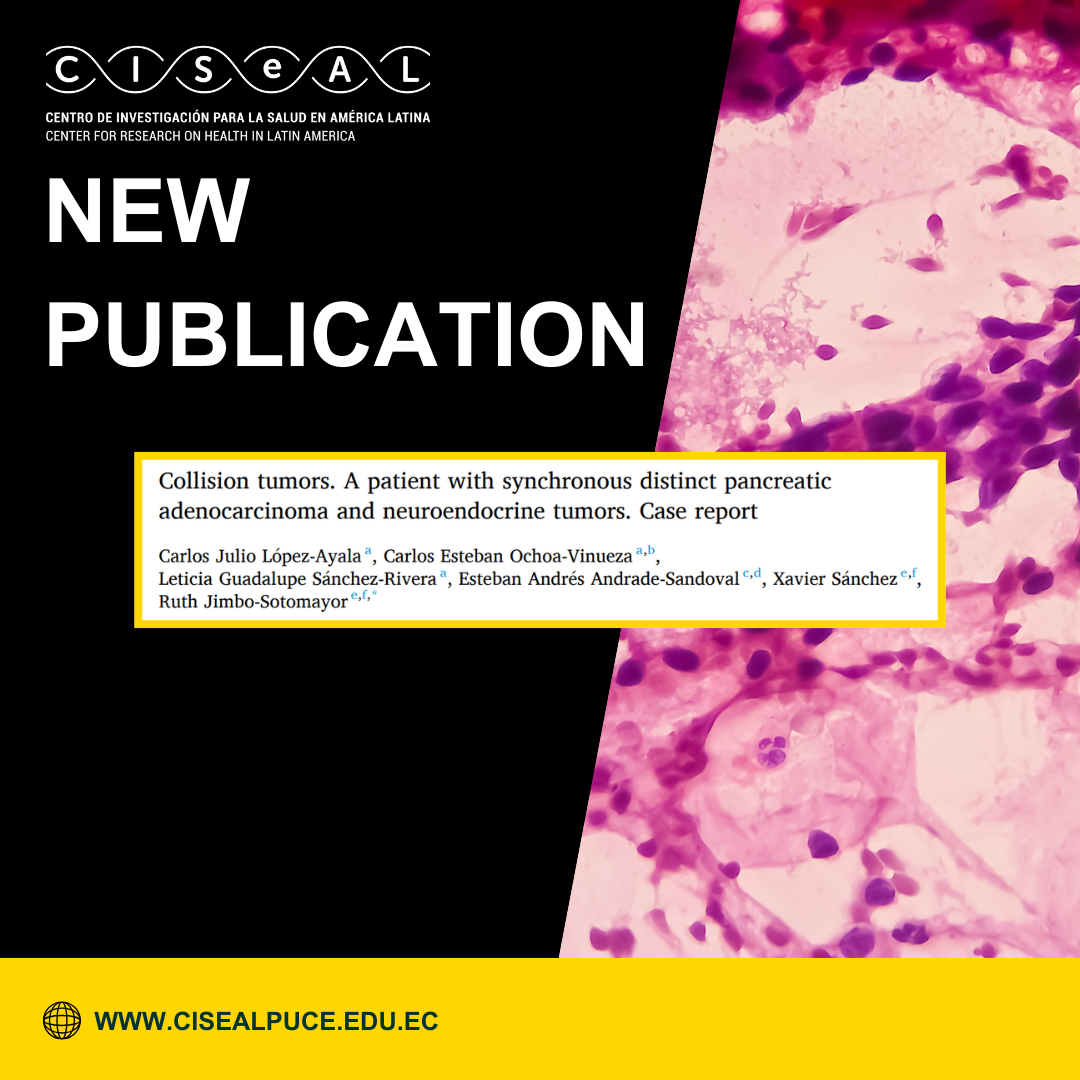 Pancreatic adenocarcinoma represents a growing problem in Western countries due to its increasing incidence, difficult early diagnosis related to nonspecific symptoms, and intrinsic aggressiveness that translates into low overall survival (≈12% at 5 years), whereas neuroendocrine tumors (NETs) generally show a better prognosis and, in the pancreas, account for only ~2% of pancreatic neoplasms; the synchronous coexistence of both within the spectrum of multiple primary tumors (5–10% in the population) is exceptional. In this context, and with the participation of CISeAL principal investigators Dr. Ruth Jimbo-Sotomayor and Dr. Xavier Sanchez, we document the case of a 52-year-old man with type 2 diabetes who presented with three weeks of abdominal pain, weight loss, and anorexia without jaundice; laboratory studies showed mild hyperbilirubinemia, elevated transaminases, and a cholestatic pattern, and MRCP plus angiotomography revealed dilation of the bile duct and duct of Wirsung along with an 18 mm lesion in the pancreatic head without vascular invasion, clinically staged as IA. After ERCP biliary stent placement and preoperative evaluation, a robot-assisted cephalic duodenopancreatectomy (Whipple procedure) was performed, allowing precise dissection and lymphadenectomy; the postoperative course was uneventful. Histopathology identified a moderately differentiated adenocarcinoma with perineural and lymphovascular invasion, three negative nodes, and pathologic stage IB (pT2 pN0 pMX), as well as a separate incidental finding: a well-differentiated neuroendocrine tumor confined to the pancreatic head (pT1 pN0 pMX) with a low proliferative index, constituting a synchronous collision-type (biphasic) tumor and not a mixed neuroendocrine–nonendocrine neoplasm (MiNEN), in which both components should be admixed and each represent >30% of the mass. The patient received six cycles of FOLFOXIRI chemotherapy over eight months and then concurrent chemoradiotherapy with capecitabine (total dose 50.4 Gy at 13 months) and continues to do well, with no evidence of tumor activity on quarterly follow-up.
Pancreatic adenocarcinoma represents a growing problem in Western countries due to its increasing incidence, difficult early diagnosis related to nonspecific symptoms, and intrinsic aggressiveness that translates into low overall survival (≈12% at 5 years), whereas neuroendocrine tumors (NETs) generally show a better prognosis and, in the pancreas, account for only ~2% of pancreatic neoplasms; the synchronous coexistence of both within the spectrum of multiple primary tumors (5–10% in the population) is exceptional. In this context, and with the participation of CISeAL principal investigators Dr. Ruth Jimbo-Sotomayor and Dr. Xavier Sanchez, we document the case of a 52-year-old man with type 2 diabetes who presented with three weeks of abdominal pain, weight loss, and anorexia without jaundice; laboratory studies showed mild hyperbilirubinemia, elevated transaminases, and a cholestatic pattern, and MRCP plus angiotomography revealed dilation of the bile duct and duct of Wirsung along with an 18 mm lesion in the pancreatic head without vascular invasion, clinically staged as IA. After ERCP biliary stent placement and preoperative evaluation, a robot-assisted cephalic duodenopancreatectomy (Whipple procedure) was performed, allowing precise dissection and lymphadenectomy; the postoperative course was uneventful. Histopathology identified a moderately differentiated adenocarcinoma with perineural and lymphovascular invasion, three negative nodes, and pathologic stage IB (pT2 pN0 pMX), as well as a separate incidental finding: a well-differentiated neuroendocrine tumor confined to the pancreatic head (pT1 pN0 pMX) with a low proliferative index, constituting a synchronous collision-type (biphasic) tumor and not a mixed neuroendocrine–nonendocrine neoplasm (MiNEN), in which both components should be admixed and each represent >30% of the mass. The patient received six cycles of FOLFOXIRI chemotherapy over eight months and then concurrent chemoradiotherapy with capecitabine (total dose 50.4 Gy at 13 months) and continues to do well, with no evidence of tumor activity on quarterly follow-up.
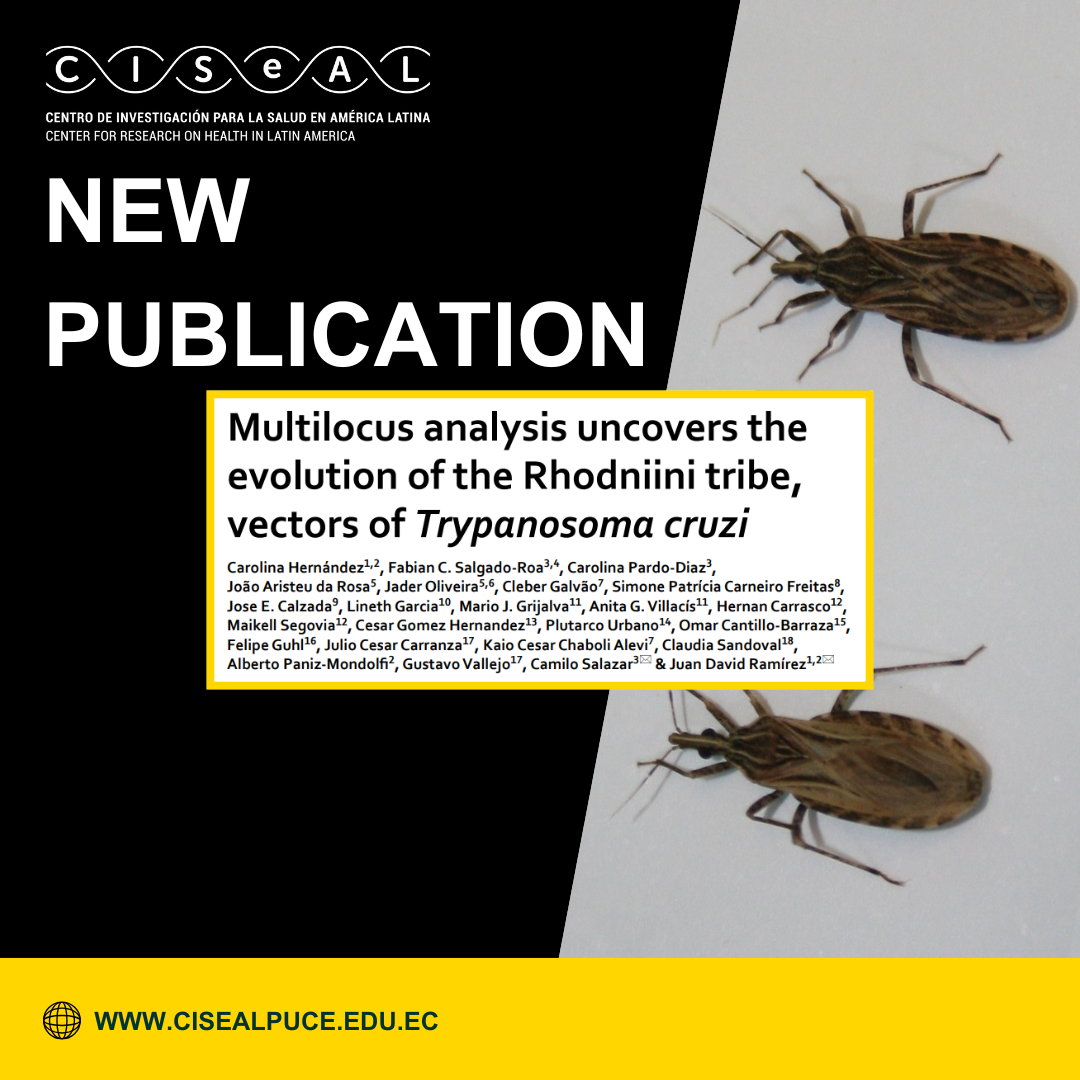 The most recent research in which CISeAL principal investigators Dr. Anita Villacís and Dr. Mario Grijalva participated sheds new light on the evolution of the group of insect vectors of Trypanosoma cruzi belonging to the tribe Rhodniini, fundamental in the transmission of Chagas disease. Through an unprecedented multilocus phylogenetic analysis, which included eight genes in 497 specimens of 17 species collected in seven countries, it was revealed that the current classification of this group does not reflect its evolutionary history. The paraphyly of the genus Rhodnius is confirmed, with the three species of the genus Psammolestes forming a monophyletic clade within it, although some alternative analyses position them as distinct sister groups. The prolixus group was found not to be monophyletic, in contrast to the pictipes and pallescens groups, which did show phylogenetic coherence. The divergence of the common ancestor of Rhodniini would have occurred approximately 5.26 million years ago, indicating a more recent origin than previously proposed, with key diversification events coinciding with Pleistocene climatic changes. Only four species—P. arthuri, R. ecuadoriensis, R. neivai, and R. neglectus—were consistently delimited as clear evolutionary units, calling into question the number of valid species recognized in the tribe.
The most recent research in which CISeAL principal investigators Dr. Anita Villacís and Dr. Mario Grijalva participated sheds new light on the evolution of the group of insect vectors of Trypanosoma cruzi belonging to the tribe Rhodniini, fundamental in the transmission of Chagas disease. Through an unprecedented multilocus phylogenetic analysis, which included eight genes in 497 specimens of 17 species collected in seven countries, it was revealed that the current classification of this group does not reflect its evolutionary history. The paraphyly of the genus Rhodnius is confirmed, with the three species of the genus Psammolestes forming a monophyletic clade within it, although some alternative analyses position them as distinct sister groups. The prolixus group was found not to be monophyletic, in contrast to the pictipes and pallescens groups, which did show phylogenetic coherence. The divergence of the common ancestor of Rhodniini would have occurred approximately 5.26 million years ago, indicating a more recent origin than previously proposed, with key diversification events coinciding with Pleistocene climatic changes. Only four species—P. arthuri, R. ecuadoriensis, R. neivai, and R. neglectus—were consistently delimited as clear evolutionary units, calling into question the number of valid species recognized in the tribe.
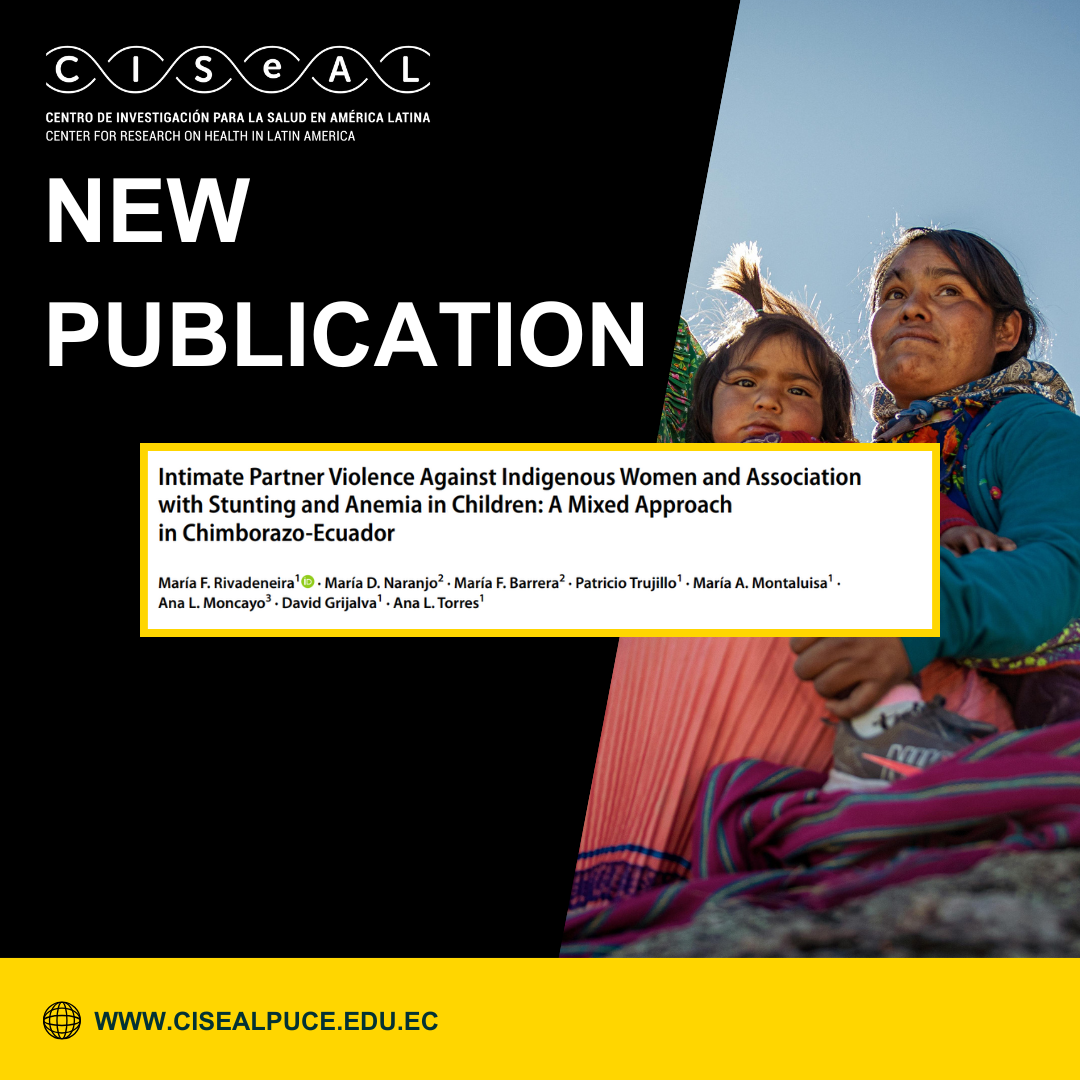
Dr. Ana Lucía Moncayo, principal investigator of CISeAL, participated in a study led by the Institute of Public Health of PUCE, which describes intimate partner violence against indigenous women and its association with stunting and anemia in children under five years of age in Chimborazo, Ecuador. Using a mixed-methods design, the researchers conducted a cross-sectional study involving 317 children and their mothers. Structured questionnaires were administered to collect information on partner abuse, socioeconomic characteristics, and alcohol consumption, complemented by anthropometric measurements and assessments of infant hemoglobin levels.
It was found that 31.5% of the women were victims of non-physical violence and 18% of physical violence. Moreover, the partner’s alcohol consumption at least twice a month was associated with a 4.2-fold higher likelihood of violence. The lack of basic services such as drinking water and sewerage significantly increased the prevalence of physical and non-physical violence in the households.



